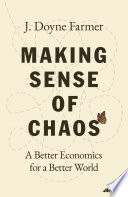

Chaos theory is a branch of mathematics that deals with systems that appear to be disordered but are actually governed by underlying patterns. This idea emphasizes the importance of recognizing that chaos is not merely random; it can be understood and predicted to some extent. The book illustrates how chaos theory applies to various fields, including economics, meteorology, and social sciences. By understanding the principles of chaos, individuals can better navigate uncertainties in their personal and professional lives. The author argues that embracing chaos can lead to innovative solutions and opportunities, as it forces us to think outside conventional frameworks.
Continue readingIn a world filled with complex systems, decision-making becomes increasingly challenging. This idea focuses on how complexity affects our choices and the potential pitfalls of oversimplifying problems. The author discusses various decision-making frameworks that can help individuals and organizations handle complex scenarios more effectively. By recognizing the interconnectedness of various elements within a system, decision-makers can make more informed choices that take into account the broader implications of their actions.
Continue readingUncertainty is a natural part of life, and the book encourages readers to embrace it rather than fear it. The author discusses strategies for cultivating resilience in the face of uncertainty, including developing a growth mindset and fostering adaptability. By learning to accept and even thrive in uncertain environments, individuals can unlock new opportunities and drive innovation. The book provides practical exercises and real-world examples to illustrate how embracing uncertainty can lead to personal and professional growth.
Continue readingNetworks play a crucial role in both chaos and order. This idea explores how social and professional networks can influence outcomes in chaotic environments. The author emphasizes the importance of building strong connections and leveraging them to navigate challenges. By understanding the dynamics of networks, individuals can enhance their ability to collaborate, share knowledge, and access resources. The book highlights the significance of both strong ties (close relationships) and weak ties (acquaintances) in creating opportunities and fostering resilience.
Continue readingInnovative thinking often arises from chaos. This idea posits that chaotic environments can serve as fertile ground for creativity and invention. The author discusses various case studies of companies and individuals who have thrived in chaotic situations by embracing risk and fostering a culture of experimentation. The book provides practical strategies for cultivating innovation within organizations, including encouraging diverse perspectives, promoting psychological safety, and allowing for failure as a learning opportunity.
Continue readingFeedback loops are essential for understanding and managing chaotic systems. This idea explains how feedback loops can help individuals and organizations monitor their progress and adjust their strategies accordingly. The author emphasizes the importance of both positive and negative feedback in driving improvement and adaptation. The book provides tools and techniques for creating effective feedback mechanisms, enabling readers to learn from their experiences and make better decisions in the future.
Continue readingIn chaotic times, having a clear sense of purpose can provide direction and motivation. This idea explores how a strong sense of purpose can help individuals and organizations navigate uncertainty and chaos. The author discusses the psychological benefits of purpose, including increased resilience, improved well-being, and enhanced performance. The book offers practical guidance on how to identify and cultivate a sense of purpose, encouraging readers to align their actions with their values and long-term goals.
Continue readingThe reading time for Making Sense of Chaos depends on the reader's pace. However, this concise book summary covers the 7 key ideas from Making Sense of Chaos, allowing you to quickly understand the main concepts, insights, and practical applications in around 23 min.
Making Sense of Chaos is definitely worth reading. The book covers essential topics including Understanding Chaos Theory, The Role of Complexity in Decision Making, Embracing Uncertainty, providing practical insights and actionable advice. Whether you read the full book or our concise summary, Making Sense of Chaos delivers valuable knowledge that can help you improve your understanding and apply these concepts in your personal or professional life.
Making Sense of Chaos was written by J. Doyne Farmer.
If you enjoyed Making Sense of Chaos by J. Doyne Farmer and want to explore similar topics or deepen your understanding, we highly recommend these related book summaries:
These books cover related themes, complementary concepts, and will help you build upon the knowledge gained from Making Sense of Chaos. Each of these summaries provides concise insights that can further enhance your understanding and practical application of the ideas presented in Making Sense of Chaos.